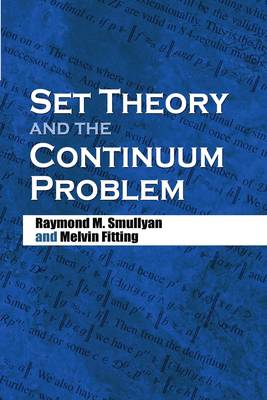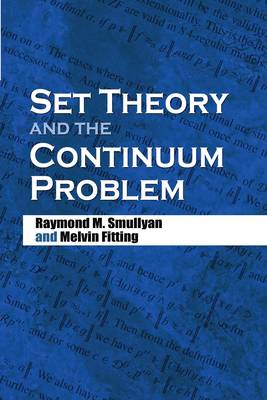
Door een staking bij bpost kan je online bestelling op dit moment iets langer onderweg zijn dan voorzien. Dringend iets nodig? Onze winkels ontvangen jou met open armen!
- Afhalen na 1 uur in een winkel met voorraad
- Gratis thuislevering in België vanaf € 30
- Ruim aanbod met 7 miljoen producten
Door een staking bij bpost kan je online bestelling op dit moment iets langer onderweg zijn dan voorzien. Dringend iets nodig? Onze winkels ontvangen jou met open armen!
- Afhalen na 1 uur in een winkel met voorraad
- Gratis thuislevering in België vanaf € 30
- Ruim aanbod met 7 miljoen producten
Zoeken
Omschrijving
A lucid, elegant, and complete survey of set theory, this volume is drawn from the authors' substantial teaching experience. The first of three parts focuses on axiomatic set theory. The second part explores the consistency of the continuum hypothesis, and the final section examines forcing and independence results.
Part One's focus on axiomatic set theory features nine chapters that examine problems related to size comparisons between infinite sets, basics of class theory, and natural numbers. Additional topics include author Raymond Smullyan's double induction principle, super induction, ordinal numbers, order isomorphism and transfinite recursion, and the axiom of foundation and cardinals. The six chapters of Part Two address Mostowski-Shepherdson mappings, reflection principles, constructible sets and constructibility, and the continuum hypothesis. The text concludes with a seven-chapter exploration of forcing and independence results. This treatment is noteworthy for its clear explanations of highly technical proofs and its discussions of countability, uncountability, and mathematical induction, which are simultaneously charming for experts and understandable to graduate students of mathematics.
Part One's focus on axiomatic set theory features nine chapters that examine problems related to size comparisons between infinite sets, basics of class theory, and natural numbers. Additional topics include author Raymond Smullyan's double induction principle, super induction, ordinal numbers, order isomorphism and transfinite recursion, and the axiom of foundation and cardinals. The six chapters of Part Two address Mostowski-Shepherdson mappings, reflection principles, constructible sets and constructibility, and the continuum hypothesis. The text concludes with a seven-chapter exploration of forcing and independence results. This treatment is noteworthy for its clear explanations of highly technical proofs and its discussions of countability, uncountability, and mathematical induction, which are simultaneously charming for experts and understandable to graduate students of mathematics.
Specificaties
Betrokkenen
- Auteur(s):
- Uitgeverij:
Inhoud
- Aantal bladzijden:
- 336
- Taal:
- Engels
- Reeks:
Eigenschappen
- Productcode (EAN):
- 9780486474847
- Verschijningsdatum:
- 20/05/2010
- Uitvoering:
- Paperback
- Formaat:
- Trade paperback (VS)
- Afmetingen:
- 150 mm x 226 mm
- Gewicht:
- 385 g

Alleen bij Standaard Boekhandel
+ 33 punten op je klantenkaart van Standaard Boekhandel
Beoordelingen
We publiceren alleen reviews die voldoen aan de voorwaarden voor reviews. Bekijk onze voorwaarden voor reviews.











